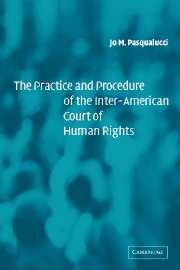Book contents
- Frontmatter
- Contents
- Foreword
- Preface
- Acknowledgments
- Table of cases
- Table of Articles of the American Convention on Human Rights
- Table of 2001 Rules of Procedure of the Inter-American Court on Human Rights
- Table of 2001 Rules of Procedure of the Inter-American Commission on Human Rights
- Table of other legal instruments and documents
- 1 Introduction
- PART I The advisory jurisdiction of the Inter-American Court
- PART II The contentious jurisdiction of the Inter-American Court of Human Rights
- PART III Provisional measures
- Appendix 1 American Convention on Human Rights
- Appendix 2 Rules of Procedure of the Inter-American Court of Human Rights
- Appendix 3 Statute of the Inter-American Court of Human Rights
- Appendix 4 Rules of Procedure of the Inter-American Commission on Human Rights
- Appendix 5 Form for presenting petitions on human rights violations
- Bibliography
- Index
Appendix 3 - Statute of the Inter-American Court of Human Rights
Published online by Cambridge University Press: 28 July 2009
- Frontmatter
- Contents
- Foreword
- Preface
- Acknowledgments
- Table of cases
- Table of Articles of the American Convention on Human Rights
- Table of 2001 Rules of Procedure of the Inter-American Court on Human Rights
- Table of 2001 Rules of Procedure of the Inter-American Commission on Human Rights
- Table of other legal instruments and documents
- 1 Introduction
- PART I The advisory jurisdiction of the Inter-American Court
- PART II The contentious jurisdiction of the Inter-American Court of Human Rights
- PART III Provisional measures
- Appendix 1 American Convention on Human Rights
- Appendix 2 Rules of Procedure of the Inter-American Court of Human Rights
- Appendix 3 Statute of the Inter-American Court of Human Rights
- Appendix 4 Rules of Procedure of the Inter-American Commission on Human Rights
- Appendix 5 Form for presenting petitions on human rights violations
- Bibliography
- Index
Summary
Adopted by the General Assembly of the OAS at its ninth regular session, held in La Paz, Bolivia, October 1979 (Resolution No. 448)
CHAPTER I
GENERAL PROVISIONS
Article 1
Nature and Legal Organization
The Inter-American Court of Human Rights is an autonomous judicial institution whose purpose is the application and interpretation of the American Convention on Human Rights. The Court exercises its functions in accordance with the provisions of the aforementioned Convention and the present Statute.
Article 2
Jurisdiction
The Court shall exercise adjudicatory and advisory jurisdiction:
Its adjudicatory jurisdiction shall be governed by the provisions of Articles 61, 62 and 63 of the Convention, and
Its advisory jurisdiction shall be governed by the provisions of Article 64 of the Convention.
Article 3
Seat
The seat of the Court shall be San José, Costa Rica; however, the Court may convene in any member state of the Organization of American States (OAS) when a majority of the Court considers it desirable, and with the prior consent of the State concerned.
The seat of the Court may be changed by a vote of two-thirds of the States Parties to the Convention, in the OAS General Assembly.
CHAPTER II
COMPOSITION OF THE COURT
Article 4
Composition
The Court shall consist of seven judges, nationals of the member states of the OAS, elected in an individual capacity from among jurists of the highest moral authority and of recognized competence in the field of human rights, who possess the qualifications required for the exercise of the highest judicial functions under the law of the State of which they are nationals or of the State that proposes them as candidates.
No two judges may be nationals of the same State.
- Type
- Chapter
- Information
- Publisher: Cambridge University PressPrint publication year: 2003



